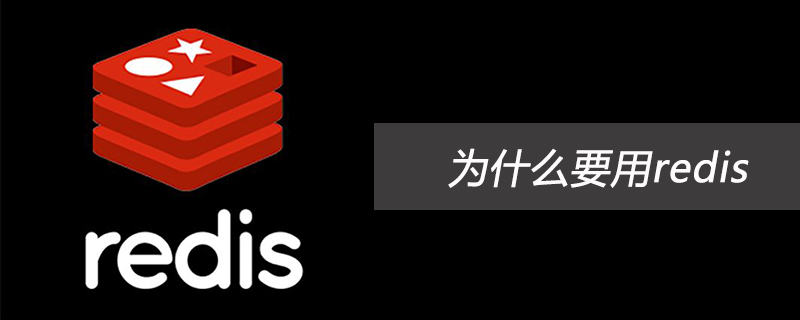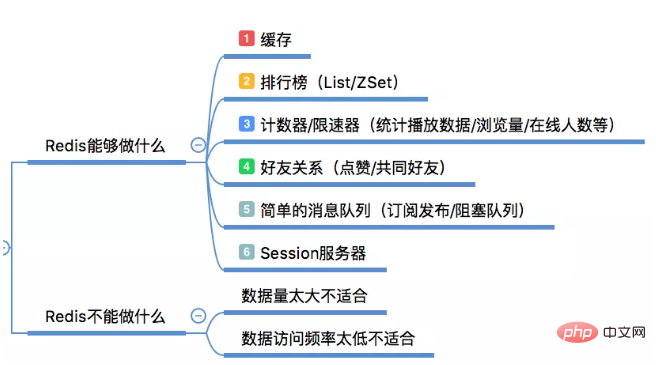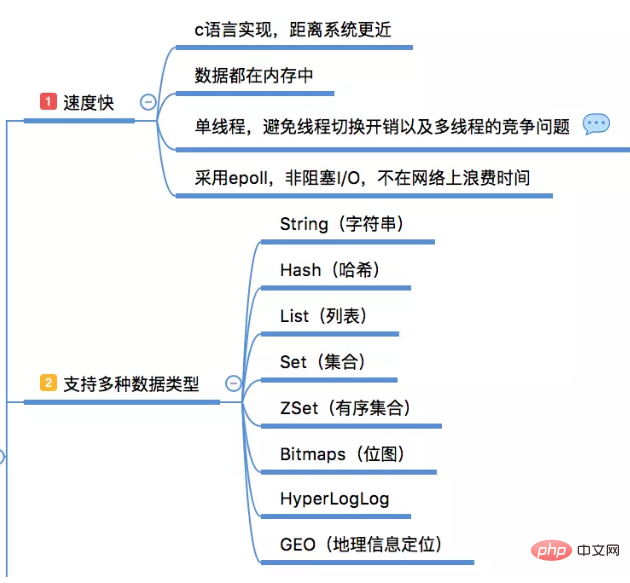
Redis can do anything
Caching, there is no doubt that this is the most well-known use of Redis today Scenes. It is very effective in improving server performance;
Ranking list. If you use a traditional relational database to do this, it will be very troublesome, but using the SortSet data structure of Redis can be very convenient;
Calculator/speed limiter, using the atomic auto-increment operation in Redis, we can count the number of user likes, user visits, etc. If MySQL is used for this type of operation, frequent reading and writing will bring considerable inconvenience. Pressure; A typical usage scenario of the speed limiter is to limit the frequency of a user's access to a certain API. Commonly used ones include rush buying to prevent users from unnecessary pressure caused by crazy clicking;
Friend relationships, using collections Some commands, such as intersection, union, difference, etc. It can easily handle functions such as mutual friends and common hobbies;
Simple message queue, in addition to Redis's own publish/subscribe mode, we can also use List to implement a queue mechanism, such as: arrival notification, Requirements such as email sending do not require high reliability, but will bring a lot of DB pressure. List can be used to complete asynchronous decoupling;
Session sharing, taking PHP as an example, the default Session is saved In the server file, if it is a cluster service, the same user may land on different machines, which will cause users to log in frequently; after using Redis to save the Session, the user can obtain the corresponding information no matter which machine he lands on. Session information.
What can't Redis do
Redis seems to be able to do a lot of things, but it is not a panacea. Use it in the right place to get twice the result with half the effort. If abused, it may lead to system instability, increased costs and other problems.
For example, Redis is used to save basic user information. Although it can support persistence, its persistence solution cannot guarantee the absolute landing of data, and may also cause Redis performance to decrease because of persistence. Too frequently will increase the pressure on the Redis service.
A simple summary is that businesses with too large amounts of data and very low data access frequency are not suitable for using Redis. If the data is too large, it will increase costs, and the access frequency is too low. Storing it in memory is a waste of resources.

You always need to find a reason for your choice
The above mentioned some usage scenarios of Redis, and there are many solutions to these scenarios. Other options include Memcache for caching, MySql for session sharing, and RabbitMQ for message queue. Why must we use Redis? Fast speed, completely based on memory, implemented in C language, the network layer uses epoll to solve high concurrency problems, and the single-threaded model avoids unnecessary context switching and competition conditions;
Note:Single thread only means using one thread to process the client's request in the network request module. Like persistence, it will reopen a thread/process for processing
Rich data types. Redis has 8 data types. Of course, the five commonly used types are String, Hash, List, Set, and SortSet. They all organize data based on key values. Each data type provides a very rich set of operation commands, which can meet most needs. If you have special needs, you can also create new commands yourself through Lua scripts (with atomicity);
 In addition to the rich data types provided, Redis also provides personalized functions such as slow query analysis, performance testing, Pipeline, transactions, Lua custom commands, Bitmaps, HyperLogLog, publish/subscribe, Geo, etc.
In addition to the rich data types provided, Redis also provides personalized functions such as slow query analysis, performance testing, Pipeline, transactions, Lua custom commands, Bitmaps, HyperLogLog, publish/subscribe, Geo, etc.
The code of Redis is open sourced on GitHub. The code is very simple and elegant, and anyone can understand its source code; its compilation and installation is also very simple, without any system dependencies; there is a very active community, various The client's language support is also very complete. In addition, it also supports transactions (never used), persistence, and master-slave replication, making high availability and distribution possible.
 As a developer, the things we use cannot be made into a black box. We should go deep into it and become more understanding and familiar with it. Today I will briefly talk about the usage scenarios of Redis and why I chose Redis instead of others. Next time, we will summarize the internal data structure of Redis and the time complexity of commonly used commands.
As a developer, the things we use cannot be made into a black box. We should go deep into it and become more understanding and familiar with it. Today I will briefly talk about the usage scenarios of Redis and why I chose Redis instead of others. Next time, we will summarize the internal data structure of Redis and the time complexity of commonly used commands.
For more Redis related knowledge, please visit the
Redis usage tutorialThe above is the detailed content of Why use redis?. For more information, please follow other related articles on the PHP Chinese website!
 Commonly used database software
Commonly used database software
 What are the in-memory databases?
What are the in-memory databases?
 Which one has faster reading speed, mongodb or redis?
Which one has faster reading speed, mongodb or redis?
 How to use redis as a cache server
How to use redis as a cache server
 How redis solves data consistency
How redis solves data consistency
 How do mysql and redis ensure double-write consistency?
How do mysql and redis ensure double-write consistency?
 What data does redis cache generally store?
What data does redis cache generally store?
 What are the 8 data types of redis
What are the 8 data types of redis